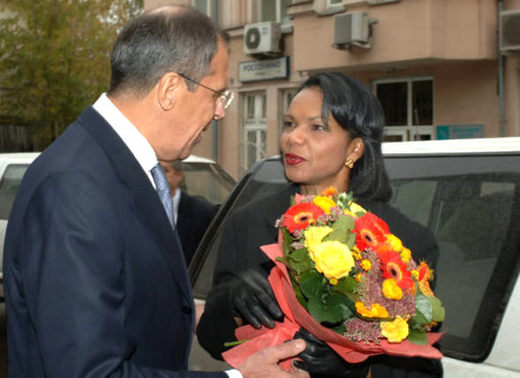Posted on : Oct.23,2006 13:17 KST
Modified on : Oct.23,2006 16:00 KST
 |
|
Russian foreign minister Sergei Lavrov greets visiting U.S. Secretary of State Condoleezza Rice on October 21. Moscow, AP Yonhap
|
Strong sanctions rejected by all but Japan
U.S. Secretary of State Condoleezza Rice completed her tour of several Asian nations on October 21, having largely failed to enlist full support for U.S. calls for increased pressure on North Korea after its recent nuclear test.
Rice visited Japan, South Korea, China, and Russia on her five-day tour. The only notable acheivement on her tour was a reconfirmation of commitment from the leaders of the four countries that they will not tolerate the possession of nuclear weapons by the North and will implement the U.N. Security Council resolution on the matter.
This is far from the full support that Washington has pursued regarding sanctions on the communist country for its bellicose move.
The four Asian countries visited remain divided in their stance on how to deal with the North. Reflecting the division, Secretary Rice has reiterated that it is a matter of each nation to seek implementation of the resolution.
Indeed, Rice saw the disagreement coming. She has said that each country in the region is in a unique situation and that different strategies need to be pursued by each. During her tour, she reiterated "I did not come here, nor will I go anyplace else, to try and dictate to governments what they ought to do in response to Resolution 1718."
In Japan, the first leg of her Asian tour, Rice made an agreement with Tokyo on cooperating on sanctions. However, when she visited Seoul, South Korea failed to make its stance clear on several pending issues, including its full participation in the Proliferation Security Initiative (PSI) and demands on suspension of two major cross-border business ventures with the North.
The four countries, participants in the stalled six-party talks aimed at removing the North’s nuclear programs, seem to understand that security conditions in the region have changed, but remain adamant in their opposition to any possible escalation of tension in the region.
China, which sent a special envoy to the North before Secretary Rice’s visit, emphasized the importance of the implementation of the resolution, but was no different from South Korea in not making its action plans clear. China, a close ally to the North, still pursues diplomatic efforts with the North, in its position as a bridge to negotiate a compromise between Pyongyang and the international community.
Russia expressed its opposition to tough sanctions on the North, saying that efforts to prevent an additional nuclear test should come ahead of punishment.
All these views are in contrast with demands by the U.S. for full cooperation by regional powers on the pursuit of sanctions. Russia even urged Washington and Pyongyang to take a flexible stance, saying that priority should be placed on lifting financial sanctions imposed on the reclusive nation if the U.S. wants to kick-start the six-party talks.

